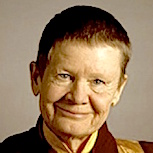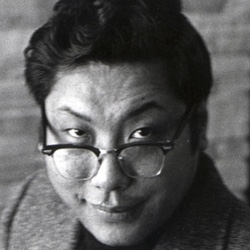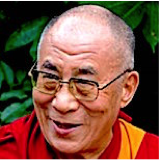

Tao Te Ching

Karmapa XVII ཨོ་རྒྱན་འཕྲིན་ལས་རྡོ་རྗ
(Orgyen Thrinlay Dorje)
1985 CE –
Born in a remote part of Tibet to nomadic parents, when he was seven years old, Tai Situpa and the Dalai Lama recognized Ogyen Trinley as the 17th Karmapa. The Chinese government agreed and planned to train him to take over for the Dalai Lama. When he was 14 though, he secretly climbed out a window and escaped to India. Mired in political challenges, he focused his teachings on a practical compassion that protects the environment, saves animals, and engages in sustainable development projects teaching that planting trees is more beneficial than many religious practices.)
Lineages
Humanism Rimé Lineage Tibetan Vajrayana
Eras
Generations
Millennials—Generation Y (1981 – 1996 CE)Unlisted Sources
Interconnected (2017)
Quotes by Karmapa XVII (35 quotes)
“Just to simply relax and rest in your own natural state is all that you need to do.”
Chapters:
57. Wu Wei
Comments: Click to comment
“Nothing is intrinsically or ultimately bad. Any situation that arises is only relatively good or bad based on many factors, including—most significantly—how you perceive the situation and how you respond to it.”
Chapters:
20. Unconventional Mind
Comments: Click to comment
“This is the dark side of the ‘American dream.’ We blame the poor, accusing them of being poor because they do not work hard enough. Yet for the most part, the poor have less because the rich have taken more.”
Chapters:
75. Greed
Comments: Click to comment
“Building our society or personal lives on competition means we are building lives of guaranteed dissatisfaction... Competition has yielded some important immediate results in the areas of survival and material development, but we should not let these advantages blind us to the serious disadvantages of competition.”
from Interconnected (2017)
Comments: Click to comment
“The yearning to live is something we share... this sense of having a living relationship with the earth's resources is necessary for us to change the way we relate to them and treat them.”
from Interconnected (2017)
Comments: Click to comment
“When we place our interconnectedness at the center of our life, empathy and contentment can become the primary resources that we turn to first.”
from Interconnected (2017)
Comments: Click to comment
“Habits can be reshaped. We can shift to productive, sustainable practices that end our current cycles of harm—harming other people, animals, and the natural world.”
from Interconnected (2017)
Comments: Click to comment
“with friends we learn to enjoy what we like and not look for faults. It does not mean there is no awareness of shortcomings... We do not reject them simply because we notice a blemish. We put their faults in context because we keep most prominently in mind all that we have found to admire and enjoy in them.”
from Interconnected (2017)
Comments: Click to comment
“what we cultivate first is equanimity... developing our ability to feel the same sense of closeness and affection toward people we find annoying and people we do not know as we do toward our loved ones.”
from Interconnected (2017)
Comments: Click to comment
“we often use the language of karma to describe the relationship between intentional actions and their full range of results... Our actions have ripple effects beyond the direct results we readily perceive”
from Interconnected (2017)
Comments: Click to comment
“Finding ourselves in situations that we did not choose but that have come about through our previous actions is simply another facet of living within webs of causality that we ignore at our own risk.”
from Interconnected (2017)
Comments: Click to comment
“we are all absolutely equal in our wish for happiness and in our longing to be free of pain and suffering... Opening up to the view of interconnectedness helps us to break down the barriers erected by our own egocentrism and to emerge from the the dark cell in which we tend to shut ourselves away.”
from Interconnected (2017)
Comments: Click to comment
“where is this I that is exclusively me?... it should be evident that 99% of what we call I is not really I. It is what we usually consider 'other.'”
from Interconnected (2017)
Comments: Click to comment
“until the moment when we have an unbearable, unconditional response to the suffering of all beings without exception, our empathy as not yet reached the limits of how far it can grow.”
Comments: Click to comment
“While he was obviously incapable of feeling any empathy whatsoever toward Jews and many other groups of people, nevertheless Hitler is known to have displayed great tenderness and empathy toward certain dogs. As such, it does not appear he was completely incapable of empathy but that its scope was terribly limited.”
from Interconnected (2017)
Comments: Click to comment
“The one resource we are all seeking, all the time—happiness—is unlimited, renewable, and most certainly increases we it is shared. When we truly and fully experience the truth of that fact, everything changes.”
from Interconnected (2017)
Comments: Click to comment
“Essentially the same problem arises whether it is in our relationships to other human beings, to animals, or to the planet—and the solution is also the same: cultivating a much broader awareness of the chains of causality that link us to other, and cultivating the feelings of closeness that can inspire us to act.”
from Interconnected (2017)
Comments: Click to comment
“We can train ourselves to shake the habits of deception and manipulation that creep into our human relationshlps, but this will take a conscious and concerted effort.”
from Interconnected (2017)
Comments: Click to comment
“if we are serious about protecting the planet's resources, it is indispensable that we find it in ourselves to change our feelings toward and our habits of consumption.”
from Interconnected (2017)
Comments: Click to comment
“if you have abundance, instead of building a higher fence, you might just build a longer table”
from Interconnected (2017)
Comments: Click to comment
“Having an excess can remind you that others are hungry or impoverished. It can inspire you to do something about that fact.”
from Interconnected (2017)
Comments: Click to comment
“See our natural resources as an inheritance that we are holding in trust for all the generations to come. We see ourselves not as owners but as stewards treasuring and protecting this inheritance.”
from Interconnected (2017)
Comments: Click to comment
“Living anywhere on the planet entails an intensive use of water [but] We act as if having easy access to something entitles us to squander it if we wish... There is absolutely no basis for thinking that the earth's water belongs to some people more than others.”
from Interconnected (2017)
Comments: Click to comment
“The essence of our life is not limited within the confines of our bodies but rather is distributed across all the people and things that we are connected to... like a vast net connecting us to all other lives on this planet”
from Interconnected (2017)
Comments: Click to comment
“the very society we create differs based on whether we believe ourselves to be fundamentally separable and independent, or fundamentally connected and interdependent.”
from Interconnected (2017)
Comments: Click to comment
“We do not need to live our lives measuring ourselves against external standards set for us by others.”
from Interconnected (2017)
Comments: Click to comment
“interdependence permeates global society and pervades all our own personal interactions with others”
from Interconnected (2017)
Comments: Click to comment
“The only contradiction is between reality and our view of reality.”
from Interconnected (2017)
Comments: Click to comment
“Consumer culture takes hold within us and spreads throughout society because we are trying to measure up... determining our worth by comparing.”
from Interconnected (2017)
Comments: Click to comment
“We expect science to save us from ourselves... we are following science and technology with even more blind faith than the blind faith with which people used to follow religions.”
from Interconnected (2017)
Comments: Click to comment
“In the 21st century, religion's promise of eternal life in heaven has been supplanted by science and technology's promise of an eternally rising standard of living on earth.”
from Interconnected (2017)
Comments: Click to comment
“The problem is our willingness to believe unquestioningly when we are told what we want to hear—that our way of life can last forever.”
from Interconnected (2017)
Comments: Click to comment
“We can each apply our own intelligence by questioning the viability of the promise that our consumerist way of life can continue unchecked.”
from Interconnected (2017)
Comments: Click to comment
“if we are serious about protecting the planet's resources, it is indispensable that we find it in ourselves to change our feelings toward and our habits of consumption.”
from Interconnected (2017)
Comments: Click to comment
“Our desire for the comfort that is driving our consumption of these resources has no natural limit. It must be self-imposed, and the time to limit our desires is now, not after it is too late.”
from Interconnected (2017)
Comments: Click to comment
Quotes about Karmapa XVII (3 quotes)

“Now more than ever, His Holiness the Karmapa’s teachings provide tools for all of us—beyond background, nationality, and culture—to work together in our interdependent, interconnected worldwide community. Everyone, and the world itself, will benefit from the profound teachings in [his] book.”
Comments: Click to comment

“The songs of the Karmapas enable us to transcend hope and fear. Through total devotion, the blessings of auspicious coincidence are realized, so that we become genuine dharmic people.”
Comments: Click to comment

“Hope lies in the generation who belong to the twenty-first century. If they can learn from the past and shape a different future, later this century the world could be a happier, more peaceful, and more environmentally stable place. I am very happy to see... the Karmapa Rinpoche taking the lead and advising practical ways to reach this goal.”
Comments: Click to comment
Comments (0)